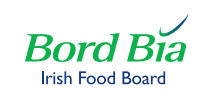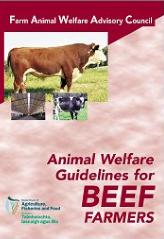Introduction of the challenge to be addressed
Consumers are increasingly conscious of animal health and welfare issues and require assurance that best practices are in operation on the farms from where their beef originates. In Ireland, Bord Bia (The Irish Food Board) has developed a Sustainable Beef and Lamb Quality Assurance Scheme (SBLQAS) covering all aspects of production. This scheme also has a specific set of standards on animal health and welfare to be observed by farmers who are participating in the SBLQAS.
Description of the Innovation
There are over 50,000 Irish beef farmers participating in the SBLQA scheme and it covers over 90% of Irish beef output. Under the scheme, farmers are required to meet best practice standards and legislation. Farm audits are conducted every 16-18 months by independent auditors on all aspects of production, including animal health and welfare.
Farmers in the SBLQAS have to adhere to best practices in the production of beef in terms of product safety and quality, while also adhering to good animal welfare standards and protecting the environment. Good Stockmanship is a key factor in animal welfare. The Producer has to be aware that the health and welfare of the animals is crucial, both to food safety and productivity on the farm.
Farmers are required to have a close relationship with their veterinary practitioner and be conscious of the need to try to prevent animal health and welfare problems. They also have to record animal health data and make this available to their veterinary practitioner as well as the farm auditor.
Under the SBLQAS producers must comply with a list of detailed standards (See Scheme Standard below) on animal health and welfare including the following;
a) Producers must comply with the requirements of the Bovine Viral Diarrhoea (BVD) Regulations, including BVD testing of animals within specified timescales and disposal of
b) Cattle producers must dispose of animals considered persistently infected (PI) with BVD virus within 5 weeks of the date of the initial test being carried out.
c) All animals suspected or considered to be PI must be isolated to minimize the risk of transmission of infection to other animals (particularly those in calf) in their own and neighbouring herds.
d) Producers must have animal handling facilities for the management of their livestock. For Cattle, a pen, crush and restraining facilities are required. These facilities must be appropriate to the enterprise and must permit animals to be restrained while minimising risk of injury and stress. These facilities must be maintained in a manner that ensures the safety of both the livestock and the stockperson.
e) All bovine animals must be presented for testing in accordance with the disease eradication and control requirements of the DAFM (Irish Department of Agriculture, Food and the Marine).
f) In the event of positive or inconclusive Tuberculosis or Brucellosis reactors being identified on the farm, there must be a procedure for isolating the animals.
g) Each Producer must follow a documented Animal Health Plan (AHP), based on the needs of the farm, which is drawn up by the Producer (ideally in conjunction with his / her veterinary practitioner and / or agricultural advisor) and reviewed annually. Template set out in Producer standard below.
h) Boundaries and fences must be maintained in a stock-proof condition to minimise contact with animals of other herds and to minimise risk of injury to animals.
i) Sick animals must be treated promptly and segregated where required.
j) All purchased stock must be monitored for signs of disease for a one-month period after purchase.
k) The producer must have a procedure for the control of internal parasites through grassland management and dosing.
l) A record of significant animal health events (e.g. abortions, disease incidences including respiratory disease, leucosis, salmonellosis, leptospirosis, paratuberculosis or Johne’s disease, blackleg, BVD, etc.) must be maintained.
m) Farm dogs and cats must be managed (vaccinations and parasite control) so as to reduce risk of the spread of parasites or disease to livestock and humans.
In addition producer are required to follow a number of recommendations of best practice on notifiable diseases, be familiar with leaflets from Animal Health Ireland on IBR, JD, Biosecurity, parasite control and colostrum management, body condition scorning of cows to ensure they are in good condition, measures to minimise lameness, hock swellings and other illnesses, and treat all such illnesses promptly, monitor the incidence of animal mortality, observation period for purchased stock, purchase animals of known health status and adhere to best practice guidelines on the introduction of purchased stock such as those published by Teagasc and Animal Health Ireland (AHI), ensure that there is good human-animal contact to minimise fear of people.
In addition to the Bord Bia SBLQAS, the Farm Animal Welfare Advisory Council (FAWAC) has produced a booklet Animal Welfare Guidelines for Beef Farmers (see attachment below). In maintaining these guidelines beef farmers can demonstrate Ireland’s prominence in the practice of farm animal welfare standards.
Impact on farm performance
The animal health and welfare aspects of the SBLQAS provides farmers with a relatively easy to implement and cost-effective way of demonstrating and communicating to consumers that they meet the highest international standards of animal health and welfare on their farms. The costs of the audits are paid for by the Department of Agriculture, with no direct costs to the farmer other than their significant time input.
During the farm audit, farmers will be questioned and examined on all the criteria and required to provide paperwork and evidence where necessary. Bord Bia operate a system of scoring which determines the farmers eligibility to the overall scheme. Farmers also have an opportunity to correct or complete outstanding issues during a close out period.
The SBLQAS clearly assist in improving the level of animal health and welfare for participating farmers. In addition, the overall SBLQAS also improves both the economic and environmental sustainability of the farm as well as helping to improve production efficiency.
Audio-visual material
 Bord Bia Logo
Bord Bia Logo
Farmer comment
“While the level of administration and paper work is significant with the SBLQAS, especially regarding the animal health aspects, there are significant benefits in a strong communication of the very high animal welfare standards on Irish farmers to consumers. We want consumers to know we care about our animals and look after them very well in our family farm set up,” Brendan Golden, beef farmer Co Mayo.
Further Information

https://www.bordbia.ie/farmers-growers/get-involved/become-quality-assured/frequently-asked-questions/